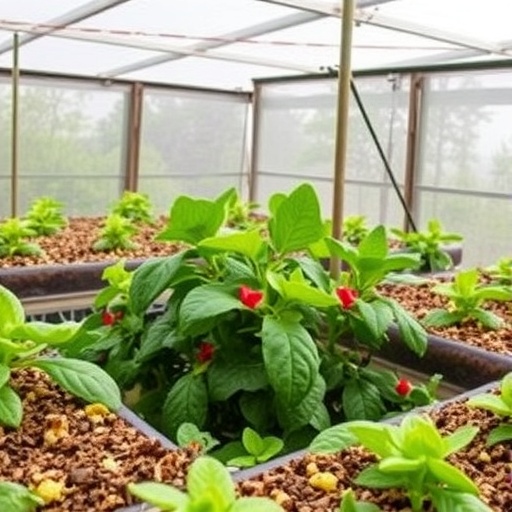In the realm of biotechnology and environmental sustainability, an innovative approach has emerged that combines agro-waste utilization with cutting-edge fermentation techniques. A recent study conducted by Kalia et al. has unveiled a groundbreaking method that enhances laccase production through solid-state fermentation using agricultural residues. This pioneering research not only promises to advance the field of biocatalysis but also paves the way for a more sustainable and eco-friendly future in waste management and bioprocessing.
Laccase, an enzyme that plays a crucial role in the oxidation of phenolic compounds, has garnered significant attention due to its potential applications in various industries, including bioremediation, pulp and paper, textiles, and food processing. The increasing need for environmentally sustainable practices has propelled researchers to explore alternative sources for laccase production. This study aims to address the critical challenge of maximizing laccase yields while simultaneously minimizing waste and promoting circular economy principles.
The research highlights the potential of utilizing agro-wastes, which are often abundant and underutilized, as a substrate for solid-state fermentation. By harnessing these agricultural by-products, the study demonstrates how we can convert waste into value-added products, thereby supporting sustainable development goals. The specific agro-wastes examined in this study include rice straw, sugarcane bagasse, and wheat bran, each possessing unique properties that contribute to the laccase production process.
Solid-state fermentation (SSF) stands out as a desirable method for laccase production due to its low cost and reduced water usage compared to traditional liquid fermentation methods. This process mimics natural conditions more closely, allowing microorganisms to thrive and efficiently convert solid substrates into valuable products. The research outlines the optimization parameters for SSF, including the selection of microbial strains, moisture content, temperature, and fermentation time, all of which are critical for enhancing enzyme yields.
In the experimental setup, the researchers evaluated different fungal strains known for their laccase-producing capabilities. The findings suggest that certain strains exhibit superior performance when paired with specific agricultural residues, leading to significantly increased enzyme production. By exploring these synergies, the study contributes to a better understanding of microbial ecology and its application in bioprocessing.
Moreover, the research incorporates a comprehensive life cycle assessment (LCA) to evaluate the environmental impacts of the proposed laccase production method. The LCA provides insights into resource consumption, energy usage, and greenhouse gas emissions associated with the fermentation process. This holistic approach not only underscores the feasibility of utilizing agro-wastes but also highlights the potential reduction in environmental footprints when integrating sustainable practices into industrial processes.
Through the lens of the LCA, the authors were able to quantify the benefits of employing agro-wastes in laccase production. The study reveals that significant reductions in carbon emissions can be achieved when biomass is repurposed for enzyme production, as opposed to traditional methods that rely on mineral resources. This finding is particularly relevant in the context of global efforts to combat climate change and promote sustainable agricultural practices.
The implications of this research extend beyond the laboratory. By demonstrating the practical applications of biotechnological advancements, the study illuminates pathways for industries to transition toward greener operations. For stakeholders in the agricultural sector, this research presents an opportunity to diversify their income streams by leveraging waste products for enzymatic production, thus turning liabilities into assets.
Policy implications also emerge from this work, as it aligns with global initiatives aimed at enhancing sustainability in agricultural practices. Encouraging the adoption of such biotechnological innovations can bolster efforts in waste reduction and resource optimization, ultimately leading to more resilient food systems. Furthermore, fostering collaborations between researchers, policymakers, and industry representatives can facilitate a more integrated approach to implementing these findings on a larger scale.
As the world grapples with the pressing issues of waste management and resource scarcity, research efforts like those conducted by Kalia et al. serve as a critical reminder of the potential locked within our agricultural systems. By fostering a mindset centered around waste valorization and sustainability, significant strides can be made in the quest for a circular economy.
In conclusion, the augmentation of laccase production through solid-state fermentation using agro-wastes marks a significant advancement in both biotechnology and environmental sustainability. This multifaceted approach not only enhances enzyme yields but also encourages the responsible use of resources. As we continue to navigate the complexities of modern industry, research like this is crucial in guiding us toward more sustainable pathways that harmonize economic growth with environmental stewardship.
Subject of Research: Augmentation of laccase production through agro-wastes and solid-state fermentation.
Article Title: Augmentation of Laccase Production using Agro-Wastes Through Solid-State Fermentation and Elucidating Its Impact using Life Cycle Assessment.
Article References:
Kalia, S., Naaz, F., Samuchiwal, S. et al. Augmentation of Laccase Production using Agro-Wastes Through Solid-State Fermentation and Elucidating Its Impact using Life Cycle Assessment.
Waste Biomass Valor (2025). https://doi.org/10.1007/s12649-025-03305-0
Image Credits: AI Generated
DOI: 10.1007/s12649-025-03305-0
Keywords: laccase, solid-state fermentation, agro-waste, sustainability, life cycle assessment, biotechnology, environmental impact, biocatalysis, waste management.
Tags: agricultural residues as fermentation substratesagro-waste utilization for enzymesbioremediation applications of laccasecircular economy in bioprocessingeco-friendly waste management solutionsenvironmental sustainability in biotechnologyinnovative approaches in enzyme productionlaccase production enhancementmaximizing enzyme yields from wastesolid-state fermentation techniquessustainable biocatalysis researchvalue-added products from agro-wastes





